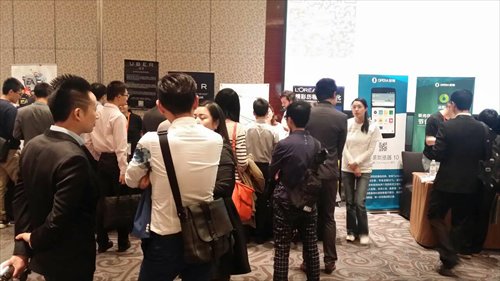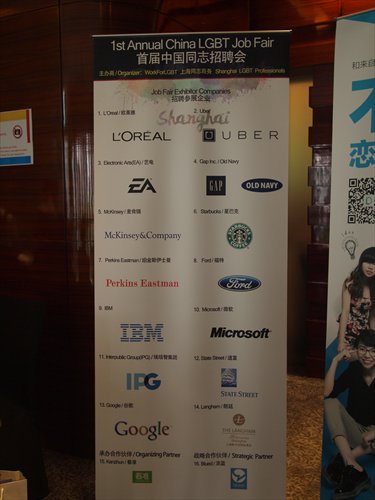HOME >> METRO SHANGHAI
Hire me – I’m gay!
By Ni Dandan Source:Global Times Published: 2015-4-28 18:23:01
Shanghai’s LGBT job fair breaks new ground

People look for work at the country's first LGBT job fair at Xintiandi. Photo: Courtesy of Steven Bielinski
It might have been any job fair in the city except for a small card on the door saying "no photos or video" and "this event is not open to the media." Although some of those attending weren't bothered about being seen there, the organizers wanted to protect the privacy of those who didn't want their attendance revealed.
This was the country's first LGBT (lesbian, gay, bisexual, and transgender) job fair and it was held on a Saturday afternoon in a hotel in trendy Xintiandi. Organizers said that it was the first time in China companies had reached out to the LGBT community in support of equality, diversity and inclusion in employment.
"I believed it's important to have a way companies can show more publicly their support for LGBT diversity. And I've been thinking what could be the ways companies can do that, which can benefit both the companies and the LGBT professionals," said Steven Bielinski, founder of WorkForLGBT and Shanghai LGBT Professionals, a nonprofit business network for LGBT employees in China and a platform for dialogue and partnership with companies on LGBT corporate equality issues.
"A job fair is a good match because companies are facing more and more competition for talent while the LGBT want to work for companies that are diverse, friendly, open and supportive of LGBT people. It's a win-win situation for both the companies and job seekers," he told the Global Times.
The four-hour fair attracted 17 companies with more than 500 LGBT people registering to attend.
More than expected
Although only around 10 percent of the companies they originally approached showed up at the groundbreaking event, Bielinski said that was more than he had expected.
"I was doing some research and I found that when the first LGBT job fairs happened in other countries, like in the US, they only had around 20 companies in the first year. That's quite close to what we have here today. It's a really positive sign," he said.
Cathy Yu applied for positions with three companies at the fair. This young lady works in branding and marketing and has been looking to change her job through different channels.
"To me this job fair is just like many others I've been to except that it's smaller in scale. But I feel that these companies, by showing such public support for the LGBT community, definitely offer a more open and diverse corporate culture than the average employers do," she told the Global Times.
Yu is apparently not "out" at her work. One of her major concerns was that she had no idea how her co-workers or her employer might judge her because of her sexual orientation. She tries to stay low-key about her personal life. Even so she feels constantly uneasy because of gossipy colleagues.
"I now work for a multinational company. It's not large. But I have so many colleagues who just prize very traditional and old-fashioned values. They often try to find out my dating status and ask why I'm not married. It's really annoying," she said.
Like many others, Yu said she would love to develop closer relationships with colleagues not only at work but outside work as well - to be real friends and share secrets. "But so far it has been really difficult for me and I know it's the same for people like me."
The Cantonese woman was accompanied to the fair by her girlfriend, surnamed Feng. Feng has just moved to Shanghai and found a job with a domestic securities company. "Who wouldn't want a workplace filled with open-minded people? It's the same for us," said Feng who was neatly dressed in a shirt and vest.
Feng said working for a domestic securities company was well-paid but staff in these companies would almost never discuss LGBT issues.

Photos: Courtesy of Steven Bielinski Photo: Ni Dandan/GT
Promotion problems
But that's not the worst part. Feng told the Global Times that on many occasions in domestic securities companies, being married was a precondition for some promotions.
"My guess is that companies don't want to have to bear the cost of marriage or maternity leave for a senior staff member that they've hired at a significant cost. But that's unfair to us. We can't possibly get married under the current legal system," she shrugged.
Both women said they thought multinational companies would probably be better at dealing with LGBT employees than Chinese companies. The 2014 China LGBT Community Survey Report pioneered by WorkForLGBT and Shanghai LGBT Professionals found that in Shanghai 41 percent of the LGBT employees surveyed worked for local private companies, 35 percent worked for foreign firms and just 17 percent were employed by Chinese State-owned enterprises.
Of the 17 companies participating in this job fair, only one was strictly Chinese - Blued. This is a mobile phone gay dating application, developed by Danlan, a gay website and the company is looking for technicians, product designers and marketing staff.
Given the nature of the company it was understandable when Liu Xin, a senior Blued manager, revealed that up to 90 percent of the company's employees were gay. Being "out" at work, Liu said he and his co-workers enjoyed a more relaxed and friendly work environment.
He said that, in general, workplaces around China were becoming more open to the LGBT community. "Thanks to television shows and films, the public has learned a lot more about us. And with the continuous import of Western culture and the growing number of foreigners to China, the public acceptance of LGBT people has been increasing," he said.
More tolerant
"What is also important is that young people born in the 1990s are joining the workforce and they have more open, understanding and tolerant attitudes toward LGBT people than the previous generation," Liu told the Global Times.
Liu said media, public relations and the Internet were three sectors where many gay people worked. Given the low average age of employees in these three sectors, most gay people could be open about themselves at work there. "My boyfriend works with an Internet company and he said his co-workers are completely okay with him being gay. Many of my other gay friends work in PR or as media editors and reporters and tell me there's no stigma about being gay at their workplaces," he said.
But he admitted that most of the time gay people just hid their sexuality. "Everyone has their own understanding of being honest about their sexuality and even if some keep this to themselves at work they don't necessarily feel repressed."
Although Blued was the only ostensibly Chinese company at the job fair, Bielinski said that nowadays many Chinese companies were taking the lead and aiming advertising and marketing directly at LGBT people in China.
"Just in the past year, you saw Taobao, Didi Dache and other Chinese companies started to advertise directly to gay and lesbian people in China. You don't see any foreign companies doing this in China," he said.
"The difference is that Western companies have more experience with internal policies and programs for LGBT. A lot of these companies are leaders with their internal policies, but externally, they are a bit cautious. Local Chinese companies understand Chinese culture very well and they understand that the post 1980s and 1990s generations are very supportive and open. But they simply have no experience with internal programs or policies," Bielinski said.
Baidu's recent Consumer Business Group survey revealed that 86 percent of the 18- to 25-year-olds in China surveyed expressed "total acceptance of homosexuality." And a venture capital firm in Hong Kong has estimated the purchasing power of the LGBT community on the Chinese mainland to be worth some $300 billion.
Along with the youthful support for the LGBT community and the potential of this market, Bielinski said that companies needed to work to distinguish themselves from the others to attract talent from a pool that accounts for 5 to 10 percent of the population.
Telling lies
"It's not just that LGBT people have to hide that part of themselves at work. They have to make up lies. They have to tell stories just to reply to colleagues' questions. That wastes your time and energy. It's not a terrible situation but it's not a good situation," he said.
"It can get a lot better. Companies now have to distinguish themselves. They can make themselves better than others by telling people this is the place where you can be honest, be open, be who you are, and where everybody will accept you. They'll respect you and treat you equally."
Jerry Fan is the marketing manager with Kanzhun.com, another company recruiting at the job fair, and he said it was important for companies to try to distinguish themselves in this way.
"As many companies in China, particularly start-ups, see most of their employees as being quite young, having a gay colleague is already no big problem. But these companies need to make their voices heard so that more LGBT people and talents in different areas, can be attracted," he told the Global Times. The Beijing-based website is looking for a branding manager based in Shanghai.
Equality and inclusion
The general manager of The Langham Shanghai, John O'Shea, told the Global Times that the hotel was a participant and supporter of the job fair because it embraced diversity, equality and inclusion. "Shanghai is one of China's most progressive cities but it's still rooted in conservative Asian values. But right here in this city, the LGBT community is gradually coming out to be heard."
Other companies at the job fair included L'Oréal, Gap, Starbucks, Google and Microsoft and all ended up with a thick stack of CVs at the end of the day.
Steven Bielinski said he was optimistic that there would be more companies involved next year.
"This was a very new business focus for companies. So when we reached out to them, some said maybe, but we need to understand more. Many are interested but they just need more time."
Bielinski said that he believes that the more companies participate in this job fair, the more benefits companies will get in return. "It's not only LGBT people but also the post 1980s and 1990s people who also want to work for a company that values diversity, comfort, and an open environment for all types of people."
Posted in: Metro Shanghai, City Panorama